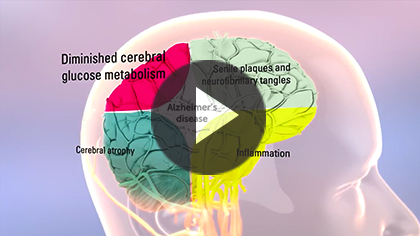Can Alzheimer’s disease be prevented?
 You may find the answer encouraging1
You may find the answer encouraging1
The goal in preventing Alzheimer’s disease has been to find ways to protect a healthy brain and delay symptoms from occurring. To date, much of the focus of research has been on medical interventions and lifestyle changes.
Medical interventions that hold some promise
Researchers have been studying the use of anti-inflammatory drugs to increase cognition (the way a person thinks, reasons, and solves problems) and brain function as people age. More studies need to be done, but there is some hope that these drugs may be able to slow the progression of Alzheimer’s disease.
You should know that there are currently no medical recommendations to take anti-inflammatory drugs because these drugs can cause harmful side effects. Before taking such drugs, it is important to talk about the potential benefits and risks with a qualified healthcare professional.
Researchers are also actively studying whether drugs that lower cholesterol and an insulin spray may be potential treatments to help prevent Alzheimer’s disease.
Certain lifestyle changes may help
While it is impossible to change your family history or genetic risk of developing Alzheimer’s disease, recent research studies suggest that certain lifestyle changes may be able to help prevent or delay the onset of Alzheimer’s disease.
Of all of the lifestyle changes that have been studied, regular exercise seems to have the greatest potential for lowering a person’s risk of developing Alzheimer’s disease. You don’t have to run a 25-mile marathon. Just walking 15 minutes a day may be enough to lower the risk of developing Alzheimer’s disease.
Engage the brain
Doing a daily crossword puzzle, along with reading books and writing activities on a regular basis, has been associated with a reduced risk of Alzheimer’s disease. So is searching for information on the Internet. The key is to engage in an activity that stimulates the brain. These days, there are many websites that offer memory games. Just type “memory enhancing games” into your web browser and you will be able to find many options, available online for free or for a fee.
Watch what you eat
Other studies have shown that people who eat a Mediterranean-type diet that is high in omega-3 fatty acids have improved memory. Eating lots of fruits and vegetables can help improve cognition. Maintaining a weight that is healthy for your body is also important.
Having a glass of red wine (once a day for women and twice a day for men) has also been associated with improving the health of the brain and other antiaging benefits.
Stay away from stress
Chronic stress has been linked to dementia and Alzheimer’s disease. Try to engage regularly in activities that promote physical and mental relaxation. Some ideas include meditation or using biofeedback tapes. Maintaining a positive outlook on life may also help benefit cognition.
Address other health issues
If you have high blood pressure or high cholesterol, treating these conditions may help improve cognition. Talk to your doctor about what treatment may be right for you.
Experts also suggest that quitting smoking may have cognitive benefits.
You may also be interested in reading about what increases the risk of developing Alzheimer’s disease.


